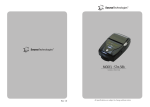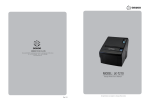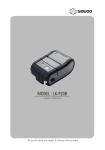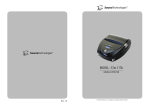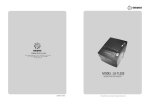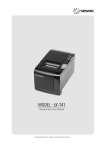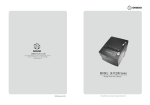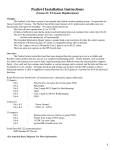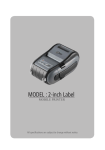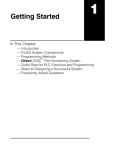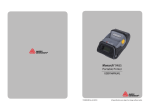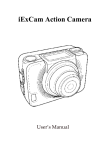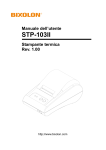Download MODEL : LK-P31
Transcript
SEWOO TECH CO.,LTD. Doosung BD, 689-20, Geumjung-dong, Gunpo-si, Gyeonggi-do, 435-862 South Korea TEL : +82-31-459-8200 FAX : +82-31-459-8880 www.miniprinter.com MODEL : LK-P31 MOBILE PRINTER Rev. 1.0 All specifications are subject to change without notice Table of Contents 1. Unpacking 2 2. Product overview 3 3. Usage and Installation 4 3-1. Control panel usage 4 3-2. Battery Installation 5 3-3. Battery removal 6 3-4. Battery charging 7 3-5. Battery charger usage 8 3-6. Roll paper installation 9 3-7. Printer Case Usage 10 3-8. Self test 11 4. Peripherals connection 13 4-1. Bluetooth connectiontion 13 4-2. Interface cable connection 14 5. Printer specification 5-1. Specification 6. Certification 15 15 17 1 2. Product overview 1. Unpacking Standard Front Power switch Control Panel Printer Open Button Paper feed button Battery Charger USB Cable Shielded Rear USB / DC JACK Roll paper CD Quick Manual Optional Battery Battery Holder (Cradle) 2 Case Usage 3 3. Usage and Installation 3-1 Control panel usage 3-2 Battery Installation Hook Button Name Power button This button is used to turn the printer on and off. When the printer is off, press this button for approximately 3 seconds and it will turn on the power. When you press this button in a state that the printer is on, the printer will turn off. Paper Feed Button Paper output can be done manually by pressing this button. Additionally, self-testing and Hexadecimal Dumping can be processed.. 1. Refer to “3-10” for self test information. 2. Refer to the service manual regarding Hexadecimal Dumping. Battery Status Lamp 1. If the Batt, LED are Lit, the battery is fully charged. 2. If you can hear beeping sound and LED light is turned off, it means that the battery is at the lowest level. 3. If the battery is not charged at all, the printer turns off automatically. Error Lamp 4 function 1. Align battery hook as shown in the picture 2. Push the battery into the printer until it locks in place. NOTE As the battery is not charged at the time of your purchase, charge the battery prior to using the printer (Battery charger or Cradle can be used to charge) ☞CAUTION Risk of explosion if battery is replaced by an incorrect type. Dispose of used batteries according to the instructions If the red light is turned on, it means there is no paper roll or the paper cover is open. 5 3-3 Battery removal 3-4 Battery charging Lamp After putting up the belt clip, remove the battery holding it up as shown above. 1. Be sure that the printer is turned off 2. After open the DC JACK cover, insert DC JACK into the printer. 3. Plug the power code to electrical outlet. 3-4-1 The status of lamp in charging Status charging charging complete Charging Lamp Red Green NOTE 1. Unless the exclusive charger is used provided by the manufacturer, the printer can be damaged, and the manufacturer is not liable for the consequential damage. 2. Before removing the battery, make sure that power is turned off. 3. Printer does not work in the status of being connected with charger only. 4. The battery should be installed to operate printer. 5. While charging, do not turn on the power. 6. Do not operate the print while charging the battery. 7. Do not connect the charger while the printer is operated. 6 7 3-5 Battery charger usage 3-6 Roll paper installation Optional Lamp DC Jack 1. Insert the battery into the battery holder as shown above 2. Connect the DC JACK to the power electrical outlet. Press the PUSH button to open the paper cover Insert the paper in the right direction 1 2 3 4 3. Plug the power code into the electrical outlet. 4. Once the charging is completed, remove the battery from the holder. 3-5-1 The status of lamp in charging Status charging charging complete Charging Lamp Red Green NOTE In the case the battery is not fixed properly in the holder, the red lamp will be blinking, Then, extract and reinsert the battery. Pull a short length of paper out of the printer and close the cover. 8 Tear off the additional paper using tear bar. 9 3-7 Printer Case Usage 3-8 Self Test Optional Open the Velcro. 1 2 3 4 Put the printer into the case following the direction as shown in the picture. Turn off the power pressing the power button for approximately 3 seconds. While you are pressing the FEED button, press the power button 1 2 3 NOTE 1. To print ASCII pattern additionally, press the Feed button once more 2. After printing ASCII pattern, the self test will be finished automatically. 3. If the Feed button is not pressed to print ASCII pattern, self test will be finished automatically after 30 seconds. Close the Velcro. 10 Fix this case to the belt with using the belt buckle. The printout is produced. 11 4. Peripherals connection The sample of self test printout This printer can communicate with Peripherals device via Bluetooth and cables. 4-1 Bluetooth Connection When the printer is installed initially or when you face a problem, you can run the self test and check the information about -Control Circuit, Mechanism, Print Quality, ROM Version After checking with self-test and no issues are found, you can examine other devices and software. This function is working independent of devices and software. 1. Printer can be connected to the PDA and PC which can do wireless communication. 2. By using Bluetooth function supported in PC, printer can be connected. NOTE Refer to the Bluetooth Manual for more details on connection. ● Motor protection from being overheated The motor should be stopped and cooled about more than 30 seconds after continuous printing 1.5 meter 12 13 5. Pritner Specification 5-1 Specification 4-2 Interface Cable Connection USB Printing Method Direct Thermal Printing Speed 60mm/sec Resolution 203 DPI X 203 DPI Character Font A (12X24), Font B (9X17) Character per line Font A : 48pt , Font B : 64pt Character set ALPHA NUMERIC Character, Extension Character Barcode EAN-8, EAN-13, Code39, ITF, UPC-A,UPC-E, Codabar, Code93, Code128, PDF 417(2D), QR Code(2D) Emulation ESC/POS Command compatible Driver Windows printer driver(7, XP, 2000, 2003, VISTA, 32 & 64bit), Windows(CE 4.2 & 5.0 / Mobile 5.0~), Linux printer driver, Symbuan, Blackberry, Android(2.1~) Sensor Paper End Sensor , Cover Open Sensor , Black Mark Sensor 1. Connect USB into the cable connector on the printer. NOTE Use the cable offered by the manufacturer (USB) Paper 2. Connect the interface cable into the USB port of the device (PDA, PC, etc.) Reliability paper type Thermal Paper width 79.5mm+/-0.5mm thickness Max.0.06mm ~0.09mm External Diameter Max. Φ25mm+/-0.5mm Internal Diameter 8.5mm +/-0.5mm TPH 50km Battery Continuous Printing 40~50min Standby: 10hours USB, Bluetooth Class2 Communications Battery Charger 14 input AC100~240V, 50/60Hz output 8.4V , 800~1400mA 15 6. Certification Battery Size Battery type Li-ion output 7.4V, 1130mAh Charging time 2~3hours W X D X H(mm) 110 X 105 X 30 W X D X H” 4.33 X 4.13 X 1.18 Weight 310g(with Battery) Environmental sealing IP42 Temperature operation -10 ~ 50℃ storage -20 ~ 60℃ operation 35 ~ 95% storage 10 ~ 95% Frequency 2402 ~2480 MHz Number of Channels 79 Channel Spacing 1 MHz Type of Modulation GFSK (1Mbps) Humidity BT FCC Information This device complies with part 15 of the FCC Results. Operation is subject to the following two conditions: (1) This Device may not cause harmful interface, and (2) This device must accept any interference received, including interference that may cause undesired operation. This Class [B] digital apparatus complies with Canadian ICES-003. Cet appareil numerique de la classe [B] est conforme a la norme NMB-003 du Canada. Operation is subject to the following two conditions: (1) this device may not cause harmful interference, and (2) this device must accept any interference received, including interference that may cause undesired operation of the device. NOTE This equipment has been tested and found to comply with the limits for CLASS B digital device, pursuant to Part 15 of FCC Rules. These limits are designed to provide reasonable protection against harmful interference when the equipment is operated in a commercial environment. This equipment generates, uses and can radiate radio frequency energy and, if not installed and used in accordance with the instuctions, may cause harmful interference to radio communications. However, there is no guarantee that interference will not occur in a particular installation. If this equipment does cause harmful interference to radio or television reception, which can be determined by turning the equipment off and on, the user is encouraged to try correct the interference by one or more of the following measures: 1.1. Reorient or relocate the receiving antenna. 1.2. Increase the separation between the equipment and receiver. 1.3. Connect the equipment into an outlet on a circuit different from that to which receiver is connected. 1.4. Consult the dealer or experienced radio/TV technician for help. WARNING Changes or modifications not expressly approved by the manufacturer could void the user's authority to operate the equipment. 16 17










